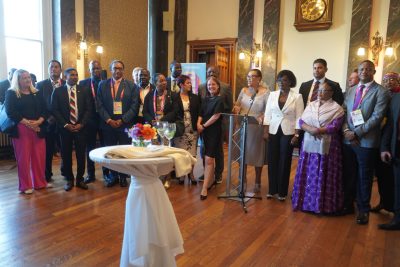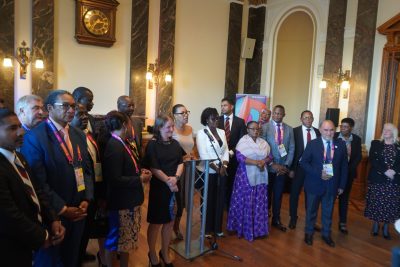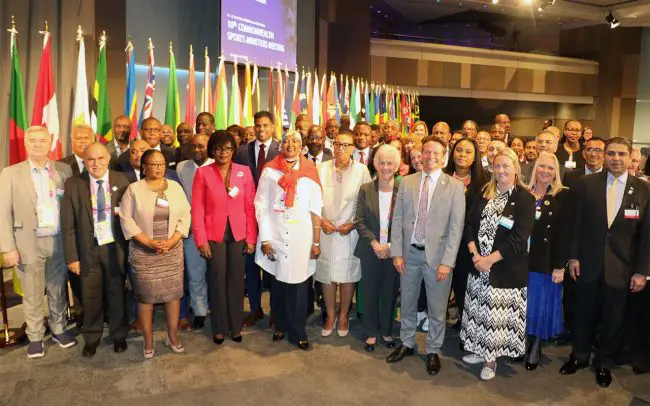Sports Ministers (pictured above) from across the Commonwealth have reaffirmed their commitment to using sport as a vehicle for ensuring the socio-economic, physical, and mental wellbeing of current and future generations – and the building of a common future that ensures that no one is left behind.
Sports Ministers gathered in Birmingham, UK – in the wings of the Commonwealth Games – for the 10th Commonwealth Sports Ministerial Meeting (10CSMM) on Wednesday. Together, with world-renowned experts, they shared Commonwealth examples of the crucial work being done in the sports sector to improve health outcomes, spark sustainable development, and bolster human rights.
Sports Ministers agreed a Ministerial Statement calling for: the adoption of sport policies and interventions to accelerate the UN 2030 Agenda for Sustainable Development; reduce incidences of preventable diseases across the Commonwealth; ensure the safeguarding of minors and the inclusion of all in sport; encourage increased transparency, good governance and integrity in competitions; and the maximisation of investment and social development opportunities – particularly for low and middle-income countries.
The Government of Trinidad and Tobago also announced that the Commonwealth Youth Games will be held there in Summer 2023 as part of the Commonwealth Year of Youth.
Also Read: 2022 Commonwealth Games: Ashe, Akintola, Ekevwo Target Historic 100m Title
The Rt Hon Patricia Scotland QC, Secretary-General of the Commonwealth, said:
“We move forward from today’s meeting of Commonwealth Sports Ministers with even greater unity and purpose, to accelerate Sport for Development and Peace priorities in line with the goals, values and aspirations of Commonwealth citizens.

“Through the impacts of COVID-19, climate change and conflict, our world faces serious, overlapping, interlinked crises. Sport reflects society, so it is exposed to society’s shocks, disruptions and challenges.
“But sport has a unique ability to drive change across borders; catalysing better health and wellbeing while promoting equality and building peace. It was clear from today’s discussions that Ministers are totally committed to harnessing the power of sport to deliver benefits across the Commonwealth, and the Secretariat is actively supporting this work.
“The 2022 Commonwealth Games in Birmingham will be an example of sport’s inspirational qualities. It will give us all great hope, joy and confidence in the human spirit; and it will offer unforgettable experiences to everyone watching. I can’t wait.”
Chair of 10CSMM and UK Minister for Sport Rt Hon Nigel Huddleston MP, said:
“The shocks brought about by the pandemic and other global challenges, from climate change to conflicts, have underlined the need for new thinking.
“We need to ensure we are maximising sport’s enormous potential to bring a positive legacy for our citizens.”
The meeting, held with the theme: Creating an Inclusive and Resilient Sport Sector; Enhancing the Contribution of Sport to the Sustainable Development Goals, saw contributions from cross-cutting speakers, including: Dame Louise Martin DBE, President of the Commonwealth Games Federation (CGF); Dr Tedros Adhanom Ghebreyesus, Director-General, World Health Organization; Lord Sebastian Coe, President of World Athletics; Bjorn Berge, Deputy Secretary-General of the Council of Europe; Gabriela Ramos, Assistant Director-General for Social and Human Sciences at UNESCO; and Mr Juan-Pablo Salazar, Coordinator for Inclusion at the Development Bank of Latin America; and CEO of CGF Katie Sadleir.
Also Read: Team Nigeria Dazzles At 2022 Commonwealth Games Welcome Reception
Dame Louise, Ambassador Dr Amina Mohamed, Cabinet Secretary for Sports, Culture and Heritage, Kenya, and previous chair of CSMM, and Ambassador Deryck Lance Murray, Chairman of the Commonwealth Advisory Body on Sport, were recognised for their outstanding contribution to Sport for Development and Peace in the Commonwealth by the Secretary-General.
Sports Ministers welcomed the introduction of 10 Guiding Actions for the Implementation of the Commonwealth Consensus Statement on Promoting Human Rights in and through Sport– a list of practical actions Member States can take over the next decade until Australia hosts the Olympic Games in 2032.
The 10 Actions correspond to the three key strands of Commonwealth Secretariat’s work on Human Rights, Governance and Integrity and are designed to help member nations achieve the corresponding Sustainable Development Goals.

The Commonwealth Secretariat also brought a draft version of safeguarding legislation – designed to give blanket protections to minors across Commonwealth nations – before Ministers.
Existing legislation in Commonwealth countries sets out where sexual activity between minors and those in positions of trust, responsibility, or authority, constitutes a criminal offence. But research work by the Commonwealth Secretariat, in collaboration with UNICEF UK and DLA Piper LLC, and an Expert Working Group comprising of Senior Officials from Law and Sports Ministries identified loopholes in the application of such legislation.
Also Read: Team Nigeria At The Commonwealth Games: Appearances, Medals Won
The Commonwealth Model Legislative Provisions on Abuse of Position of Trust provides a model for legal protections for under 18-year-olds, whether in a sporting context or otherwise. It will be tabled again before Commonwealth Law Ministers, later this year before being officially released.
Sports Ministers noted the power of large sporting events, such as the Games, for inspiring generations to be more active and creating positive legacies that can promoting the shared values and principles of the Commonwealth.
10CSMM also celebrated the innovative ways Member Countries are working to create and sustain an inclusive and resilient sport sector post-pandemic.
Examples came from the West Indies, Kenya, Cyprus, the UK, and Trinidad and Tobago.
Sports Ministers further called for better data collection to enhance the measurement of the impact of sport, physical activity, and physical education on prioritised development goals, with a view to developing a strong evidence base required to increase investment and guide the application of future policies.







